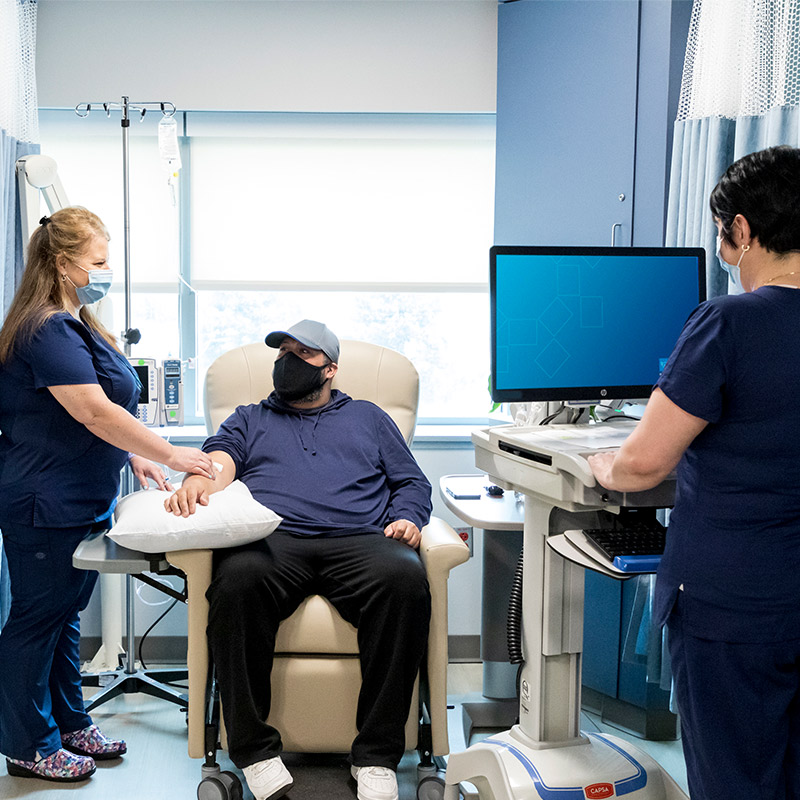Aquatic Therapy Helps Fitness Enthusiast Improve Strength after Multiple Sclerosis Diagnosis

July 01, 2022
About 30 years ago, Frank D’Arrigo, 61, of Paramus, New Jersey, experienced double-vision while on a business trip to Las Vegas. Frank and his physicians didn’t realize at the time that the symptom was related to multiple sclerosis (MS), and Frank continued to live relatively symptom-free for more than 25 years.
But when Frank sought treatment for lower back pain in 2019, his imaging scans showed lesions that indicated there was damage to the protective coating of his nerves called the myelin sheath - which led to an MS diagnosis.
Damage to myelin results in problems with nerve signal transmission throughout the body, which can cause a wide range of MS symptoms, including speech, vision, sexual, balance, mobility, bowel and urinary problems. Symptoms vary from person to person depending on the amount of nerve damage and which nerves are affected. MS symptoms may also come and go, improving partially or completely for months or years - a form of the disease known as relapsing-remitting MS.
At the time of his diagnosis, Frank’s primary MS symptoms were balance problems, difficulty walking long distances and trouble tolerating hot weather.
On the recommendation of his neighbor, Frank went to see Krupa Pandey, M.D., neurologist and director of the MS Comprehensive Care Center at the Neuroscience Institute at Hackensack University Medical Center.
A frequent gym-goer for his entire life, Frank wanted to do whatever he could to maintain his physical fitness after his MS diagnosis.
“I went to the gym five to six days a week for 20 years,” says Frank. “I wanted to get back to the gym after my diagnosis, but it was difficult with my balance issues, so Dr. Pandey recommended aquatic therapy.”
Aquatic therapy, also known as hydrotherapy, is a type of physical therapy where patients perform exercises in a pool under the supervision of a qualified physical therapist.
“Frank has kept himself in excellent physical condition throughout his life, and continuing to stay in shape is important for anyone who is diagnosed with MS,” says Dr. Pandey. “Aquatic therapy is a low-impact exercise option that can help people with MS maintain strength, flexibility and mobility despite symptoms like balance issues and pain.”
Building Strength and Improving Balance
Frank went to aquatic therapy two to three days a week for six months. Under the supervision of physical therapist Ellen Ryan, he learned how to perform various exercises using the resistance of the water to help him build strength.
“I could feel my strength increasing after a few weeks, and I was starting to get closer to normal,” says Frank. “Ellen was wonderful. She pushed me, but she also knew my limitations.”
After physical therapy ended, Frank became a member at Hackensack Meridian Fitness & Wellness in Maywood, New Jersey. His new weekly fitness routine includes three workouts in the pool performing his aquatic therapy exercises, and three workouts in the facility’s weight-training area.
“Aquatic therapy helped me tremendously, both mentally and physically,” says Frank.
A Proactive, Positive Approach to Living with MS
Frank said he is determined to learn to live with his MS diagnosis — and aquatic therapy is part of his proactive strategy to manage his symptoms and maintain his fitness level.
“My family and co-workers noticed that I was walking a lot better after aquatic therapy,” said Frank.
He also credits his wife and two kids — one of whom is a physical therapist — and extended family with providing a strong foundation of support. His job as a vice president at copier company Konica Minolta motivates him and provides the opportunity to tap into his social, “people-person” nature.
“I don’t hide my diagnosis from anyone and speak openly and freely about my condition,” says Frank. “I have a wonderful wife, two wonderful kids and a job that I love. My faith in God is also important to me.”
Frank says that one of the best pieces of advice he received from Dr. Pandey was to remember that MS affects everyone differently — a comforting perspective from a trusted expert.
“When you hear that you have MS, it is certainly life-changing,” says Frank. “But I want people to know that it’s not a death sentence. You can learn to live with it, manage your limitations, and do what’s necessary to live a full and productive life.”
Next Steps & Resources:
- Meet our Experts: Krupa Pandey, M.D.
- To make an appointment with Dr. Pandey or a doctor near you, call 800-822-8905 or visit our website.
- Learn about Hackensack Meridian Fitness & Wellness, physical therapy and the Multiple Sclerosis (MS) Centers at Hackensack Meridian Health.
The material provided through HealthU is intended to be used as general information only and should not replace the advice of your physician. Always consult your physician for individual care.

What Is Neuro Fatigue?
Neuro fatigue explained. Learn about causes, treatments, and prevention strategies from Dr. Krupa Pandey. Schedule an appointment today.

Restaurant Owner Faces MS Diagnosis
Restaurant owner Darrell Wordelmann's MS journey: Find expert care & support at Jersey Shore University Medical Center's MS Center. Learn more.

How to Beat Brain Fog
Beat brain fog. Dr. Duncan offers tips for improved focus and memory. Learn strategies for better sleep and cognitive health. Call 800-822-8905.

Sayreville Man Shares Journey Back from Brain Injury
JFK Johnson Center for Brain Injuries provides life-changing care for 28-year-old Dan Buhler, Jr., after suffering severe head injuries while working.



